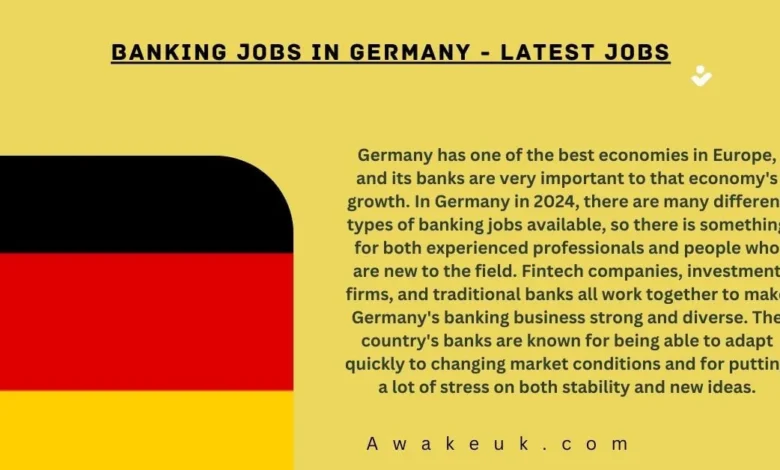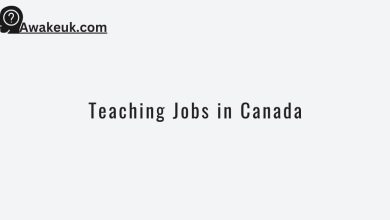Banking Jobs in Germany – Latest Jobs

Germany has one of the best economies in Europe, and its banks are very important to that economy’s growth. In Germany in 2024, there are many different types of banking jobs available, so there is something for both experienced professionals and people who are new to the field.
Fintech companies, investment firms, and traditional banks all work together to make Germany’s banking business strong and diverse. The country’s banks are known for being able to adapt quickly to changing market conditions and for putting a lot of stress on both stability and new ideas.
This post tells you everything you need to know about the newest banking jobs in Germany in 2024, such as the Top Banks Hiring in Germany, some typical interview questions for banking jobs, how to apply, and a lot more.
Top Banks Hiring in Germany
The top banks in Germany that are known for hiring include:
- Deutsche Bank AG – Germany’s leading bank, offering a wide range of services.
- Commerzbank AG – One of the largest commercial banks in Germany.
- Kreditanstalt für Wiederaufbau (KfW) – A government-owned development bank
- DZ BANK AG – The second largest bank by asset size in Germany.
- UniCredit Bank AG – A major international bank with a significant presence in Germany.
- Landesbank Baden-Württemberg – One of the largest regional banks
- ING-DiBa AG – The third largest bank in Germany by the number of customers
- Landesbank Hessen-Thüringen GZ – A central bank for the savings banks in Hesse and Thuringia
- NRW.BANK – The state development bank of North Rhine-Westphalia
- Bayerische Landesbank – A publicly regulated bank based in Munich.
Banking job openings in Germany in 2024
Here are 10 recent banking job openings in Germany:
- Country Manager for Germany – Banking Clients at FICO.
- Senior Banking Consultant at FiSer Consulting in Frankfurt.
- Bank Bilanzbuchhalter at Accotex – Rieter Components Germany GmbH.
- Intern Structured Export Finance (f/m/x) at ING Deutschland in Frankfurt.
- Director IEG – INVESTMENT BANKING GROUP in Berlin.
- Structured Products Marketing Manager (all genders) at BNP Paribas S.A. in Frankfurt.
- Global Banking & Markets, Investment Banking, Classic, Associate, at Goldman Sachs in Frankfurt.
- Product-Management-Officer – Collateral Management (f/m/d) at Clearstream Banking AG in Frankfurt
- Business Analyst with Investment Banking at HSS Soft in München
- Junior Manager – Credit Management in Real Estate Finance (w/m/d) at Aareal Bank AG
Requirements in Germany for banking positions
In Germany, the most common requirements for work in banking are:
- Education: Most of the time, you need a bachelor’s degree in finance, economics, business administration, or a similar field.
- Proficiency in a Language: Most jobs demand fluency in German, but some may only need English.
- Professional Training: For some jobs, you may need to go through an apprenticeship or trade training called “Banker Ausbildung,” which can last for three to four years.
- Additional Skills: It’s also helpful to be good at math and analysis, be interested in finance and banking, be customer-focused, and know how to use a computer.
How do I prepare for a job interview in the German banking sector?
There are a few things you need to do to make sure you look like an educated and professional candidate for a job interview in the German banking sector. Here are some important things to think about:
- Understand the Interview Style: Most job talks in Germany are formal. If you are not told otherwise, you should use the polite “Sie” when you talk to your interviewer.
- Research: Find out about the company, how it works, and the German banking business. This will help you make sure that your answers are in line with what the company stands for and what they expect from you.
- Review Application Materials: Check your cover letter and CV again to make sure you can talk about your skills and experience in more depth.
- Review Application Materials: Get ready with answers to common interview questions. This could include questions about your skills, weaknesses, and work history.
- Practice Common Questions: For the interview, dress in nice work clothes. This shows that you are responsible and care about the culture of the company.
- Dress Appropriately: Bring copies of your CV, awards, and any other important papers with you.
- Bring Necessary Documents: Get there about 10 minutes before the interview time.
- Punctuality: Look the person in the interviewer in the eyes to show that you are confident and interested.
- Prepare for Assessment Centers: For higher-level jobs, some companies use assessment centers where you work with other applicants.
- Technical Setup: If the interview is done over the phone, make sure your technology is set up properly and that you have a professional, quiet background.
Some common interview questions for banking jobs
When you are getting ready for a job interview in Germany in banking, you can expect a mix of general interview questions and questions that are special to banking. Here are some things that you might be asked:
General Questions:
- Please tell me a little about yourself.
- What are the best and worst things about you?
- In five years, where do you see yourself?
- What makes you want to work for our bank?
- In your work life, describe a time when you had a disagreement and how you solved it.
Banking-Specific Questions:
- Walk me through your process of approving or rejecting a loan request.
- What sector would you currently choose to invest in and why?
- How would you manage a company that is behind on its loan payments?
- What banking software systems have you used?
- Tell me about a time you faced an ethical dilemma at work. How did you respond to it?
Role-Specific Questions:
- What does a normal working day look like for someone in this role?
- What are the biggest challenges you anticipate in this job?
- Can you provide examples of how you have contributed to your team in the past?
Company-Specific Questions:
- Who is our current CEO and what can you tell me about our business model?
- What do you consider to be the most significant deals our bank has completed in the last year?
- Who would you consider to be our major competitor and why?
Don’t forget that it’s not enough to have the right answers; you also need to know how to say them. You should be ready to talk about examples from your past that show you have the skills and abilities for the banking job.
Read Also: Admin Assistant Jobs in Germany with Visa Sponsorship
Are there any specific certifications that would be helpful?
Yes, some certifications can help you a lot when you’re looking for work in German banks. These credentials are often seen as valuable:
- Bachelor’s Degree: A bachelor’s degree is needed for most banking jobs in Germany. The degree should be in finance, economics, business administration, or a closely related area.
- German Language Proficiency: Being able to speak and write German well is often needed for many jobs, so you might need to get a certificate in the language.
- Credentials: In the banking industry, credentials like the CFA (Chartered Financial Analyst), CPA (Certified Public Accountant), CBCA (Certified Banking & Credit Analyst), FRM (Financial Risk Manager), or an MBA (Master of Business Administration) are highly valued and can help you get a job.
- Ausbildung: In Germany, a popular way to get into banking is through vocational training or apprenticeship programs, which are called Ausbildung. If you do an Ausbildung in banking, you can get real-world training and a recognized credential.
Application Process
Making a strong CV or resume and getting ready for job interviews are two very important steps in the application process. Candidates’ chances of getting sought-after banking jobs can be greatly increased by highlighting related skills and experiences.
In Germany, the steps you need to take to apply for a banking job are usually these:
- Job Search: To begin, look for open banking jobs. Use websites that help you find jobs, company career pages, and professional networking sites like LinkedIn.
- Application Documents: Get your application materials ready. These should include a cover letter, a CV, and any certificates or references that are applicable. As a general rule, people in Germany send these files via email as PDFs or straight to the company’s career website.
- Cover Letter: In your cover letter, you should describe yourself, say why you want the job, and list your skills and experiences that make you a good candidate.
- Curriculum vitae (CV): Your CV should be set up like a table and include information about yourself, your work history, your schooling, your language skills, and any other skills or interests you have. In Germany, most employers expect you to have a picture on your CV.
- Online Application: You can send your application through the company’s website or by email, as stated in the job posting. Before you send it, make sure that all the information is right.
- Interview Process: If your application is accepted, you will be asked to come in for an interview. There are different lengths of interviews, and sometimes they can last for weeks.
Advice for Aspiring Banking Professionals
If you want to work in banks, here are some tips that will help you do well:
- Foundation in Education: Begin by getting a good education in finance or a similar subject. Most of the time, a bachelor’s degree is the bare minimum.
- Specialized Skills: Learn skills that employers want, like how to analyze data, make financial models, and use financial tools.
- Language Skills: If you want to work in German business, you need to be able to speak and write German well. You might want to get a language qualification.
- Job internships: Do an internship that is useful. These kinds of activities give you useful skills and can lead to full-time jobs.
- Networking: Make a group of business contacts. Join professional groups, go to events in your field, and meet with other professionals and peers.
- Keep up with Stay up to date on changes in the law and trends in your business. This will help you be ready for changes in the market and make the right adjustments.
- Certifications: Get certifications like CFA, CPA, or FRM to show that you are qualified and make you more marketable.
- Web Presence: Make your web presence strong. Make your LinkedIn profile better and interact with material in your field.
- Continuous Learning: The financial industry is always changing, so make it a point to keep learning throughout your life.
- Mentorship: Look for people who can help you with your job and give you advice based on their own experiences.
Conclusion
As a conclusion, people who want to have satisfying careers in finance will find that banking jobs in Germany offer a lot of exciting opportunities. Germany is still a popular place for banking workers to work because it has a stable economy, encourages innovation, and is dedicated to quality.
Frequently Asked Questions
-
Is German language proficiency necessary for banking jobs in Germany?
Fluency in German is helpful, especially for customer-facing jobs, but many international banks in Germany work in English, so people who don’t speak German as their first language can still find work.
-
What are the typical entry-level roles in the banking sector in Germany?
Job openings in banks at the entry-level could include customer service reps, financial analysts, and credit analysts. These jobs are good starting points for moving up in your work in the industry.



